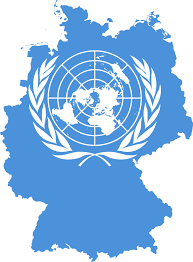Introduction
German y went through many ups and downs in its economic, political, social and international status. The impact of globalization was strong on the German’s after the fall of Berlin wall and the unification of east and west Germany, tearing down the Soviet Empire. After this, never have so many new workers and consumers entered the global economy as quickly and suddenly. Trade in products has been supplemented by trade in tasks. Companies have supplemented trade with investment and moved from geographically concentrated production networks to geographically dispersed networks. (Daniel and Joseph, 2008)
y went through many ups and downs in its economic, political, social and international status. The impact of globalization was strong on the German’s after the fall of Berlin wall and the unification of east and west Germany, tearing down the Soviet Empire. After this, never have so many new workers and consumers entered the global economy as quickly and suddenly. Trade in products has been supplemented by trade in tasks. Companies have supplemented trade with investment and moved from geographically concentrated production networks to geographically dispersed networks. (Daniel and Joseph, 2008)
A variety of forces – rapid technological diffusion, greater trade opportunities, lower barriers to investment, policy reforms at home -have generated greater flows of goods and services, people, capital and ideas within Europe and Germany and between Germany and the rest of the world. On the whole, these forces have fostered large gains for Germany: robust growth in exports and imports; strong outflows and inflows of investment; greater technological diffusion; net portfolio inflows; net inflows of labor; more jobs, higher incomes, modest increases in wages; and higher GDP growth. Some effects are crosscutting: lower priced imports push inflation downward while rising food and fuel costs push inflation upward. On balance, most Germans are living better today than they were when the Iron Curtain fell and the Cold War ended, in part because of globalization.(ibid)
Challenges of globalization
To begin with, globalization is the continuation of the trend of growing openness and integration among economies that have brought the world a half century of unparalleled prosperity. That openness is now being extended to capital markets. The resulting flow of private capital to developing markets has not only helped finance increased production in recipient countries; it has also helped sustain demand for industrial country exports. For example, during 1990 to 1995, German exports to developing countries increased by close to 10 percent per year on average in U.S. dollar terms, while German exports to industrial countries increased by only 3 percent annually over the same period. As a result, by 1995, exports to developing countries represented 25 percent of total German exports, compared to just 19 percent at the beginning of the decade(1).
But with these increased opportunities also come additional risks. The first is financial instability followed by marginalization. Countries that are unable to participate in the expansion of world trade or attract significant amounts of private investment run the risk of being left behind by the global economy. And the countries at greatest risk of being marginalized are precisely those most in need of the trade, investment and growth that globalization could bring.
Secondly, the risks appear to be outside the economic sphere. The preservation of one’s culture, tradition, its values , and a unique identity of itself arrests the attention. Because the globalization welcomes all the other heterogeneous culture, most of the germans are afraid of losing the nationalism to other alien concepts such as Islamization of Germany.
Future of Germany
Germany has been one of the globalization’s greatest beneficiaries and stands primed to benefit even more. German consumers, workers, and companies have all prospered from globalization. On one hand, Germany has been the world’s no.1 exporter of goods for five straight years. It is the world’s third largest exporter of services. Germany’s goods exports have doubled and its commercial services exports have chalked up about 14% annual growth during this decade -ahead of global trends. On the other hand, German’s workforce is exacerbating skill shortages and exposing mismatches between available jobs and relevant skills. Globalization is not responsible for these demographic pressures, but it exposes the demographic challenges starkly. Immigration is essential to Germany’s future prosperity, and Germany remains a top destination for migrants. But Germany is a magnet for the unskilled and recent efforts to facilitate the inflow of skilled migrants have yet to demonstrate success. Domestic reforms and new approaches are urgently needed.
References
Camdessus Michel, Jan 10, 1997 “Globalization and its Challenges for Germany, Europe, and the IMF” International Monetary Fund, Available at https://www.imf.org/en/News/Articles/2015/09/28/04/53/spmds9701, Retrieved on 12/2/2016
Daniel S. Hamilton and Joseph P. Quinlan, 2008 “Globalization and Europe: Prospering in the New Whirled Order” Germany and Globalization, Center for Transatlantic Relations
Paul H. Nitze School of Advanced International Studies Johns Hopkins University, Pg no. 2 Retrieved on 12/2/2016




 To deal with the air pollution in Germany, the German authorities stressed that people should drive less on a voluntary basis to improve the air quality in their cities.
To deal with the air pollution in Germany, the German authorities stressed that people should drive less on a voluntary basis to improve the air quality in their cities.

 kitchen). Sometimes the fourth “K” is mentioned: Kleider (clothes). Throughout the 20th century, however, women have gradually won victories in their quest for equal rights. In 1919 they received the right to vote. Profound changes also were made by World War II. During the war, women assumed positions traditionally held by men. After the war, the so-called Trümmerfrauen (women of the rubble) tended the wounded, buried the dead, salvaged belongings, and began the hard task of rebuilding war-torn Germany by simply clearing away the rubble
kitchen). Sometimes the fourth “K” is mentioned: Kleider (clothes). Throughout the 20th century, however, women have gradually won victories in their quest for equal rights. In 1919 they received the right to vote. Profound changes also were made by World War II. During the war, women assumed positions traditionally held by men. After the war, the so-called Trümmerfrauen (women of the rubble) tended the wounded, buried the dead, salvaged belongings, and began the hard task of rebuilding war-torn Germany by simply clearing away the rubble alification in 2011, according
alification in 2011, according The reasons behind the pay gap and promotion hurdles are both complicated and manifold and include the facts that women are more likely to work in lower paid job sectors such as healthcare or retail, work part time – and that there are often fewer promotion opportunities for those not in full-time employment
The reasons behind the pay gap and promotion hurdles are both complicated and manifold and include the facts that women are more likely to work in lower paid job sectors such as healthcare or retail, work part time – and that there are often fewer promotion opportunities for those not in full-time employment p after the Second World War. On September 18, 1973 Germany was admitted as a full member of United Nation. It took around 30 years for Germany to be a member of United Nation, which seemed unthinkable at first.
p after the Second World War. On September 18, 1973 Germany was admitted as a full member of United Nation. It took around 30 years for Germany to be a member of United Nation, which seemed unthinkable at first. religion in Germany. They are more or less evenly split between the mainstream denominations of Lutheran-Protestantism and Calvinism united in the EKD (Evangelical Church in Germany) and the Roman Catholic Church. Due to the historical development of religion in Germany, these denominations are concentrated in specific regions
religion in Germany. They are more or less evenly split between the mainstream denominations of Lutheran-Protestantism and Calvinism united in the EKD (Evangelical Church in Germany) and the Roman Catholic Church. Due to the historical development of religion in Germany, these denominations are concentrated in specific regions

 Facebook founder Mark Zuckerburg paid 19 billion for messaging service “WhatsApp”. According to Mark “Our mission is to make the world more open and connected. We do this by building services that help people share any type of content with any group of people they want. WhatsApp will help us do this by continuing to develop a service that people around the world love to use every day”
Facebook founder Mark Zuckerburg paid 19 billion for messaging service “WhatsApp”. According to Mark “Our mission is to make the world more open and connected. We do this by building services that help people share any type of content with any group of people they want. WhatsApp will help us do this by continuing to develop a service that people around the world love to use every day” Facebook promised that WhatsApp wouldn’t change. It would remain an independent entity without an advertising-based business model. But apparently, these promises are not enough for German users.As a reminder, Angela Merkel’s phone has been tapped for years by the U.S. intelligence agencies. It’s a very pragmatic example of a privacy breach. It probably resonated with Germans
Facebook promised that WhatsApp wouldn’t change. It would remain an independent entity without an advertising-based business model. But apparently, these promises are not enough for German users.As a reminder, Angela Merkel’s phone has been tapped for years by the U.S. intelligence agencies. It’s a very pragmatic example of a privacy breach. It probably resonated with Germans